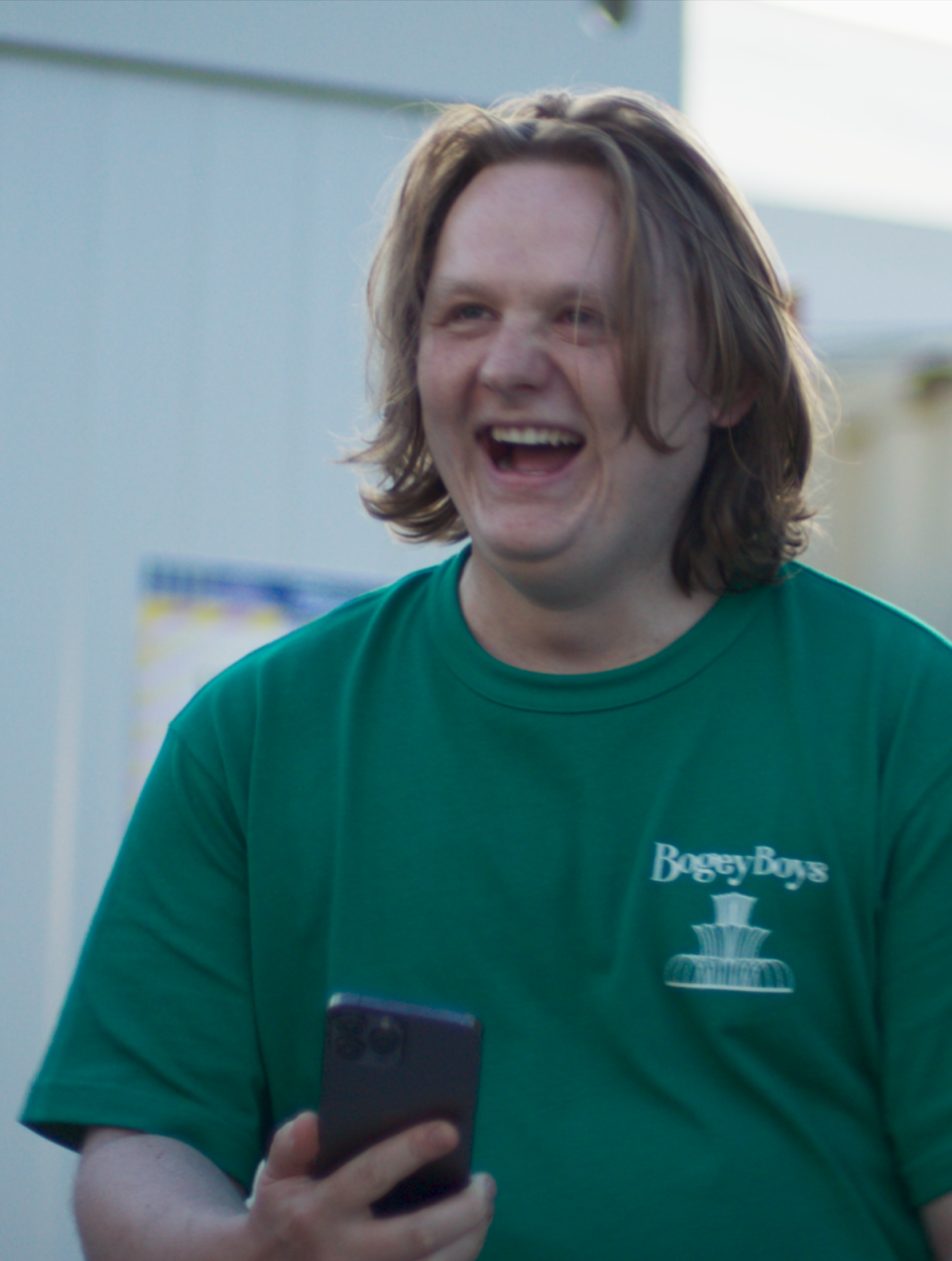‘He’s shown you can still go on to achieve great things’: How Lewis Capaldi changed the face of Tourette’s

- Oops!Something went wrong.Please try again later.
When a friend knocked on her door and asked her to come out and play, the eight-year-old Suzi Payton stuck her middle finger up in response. “I shocked my friend and myself,” the now 47-year-old remembers. “I was terrified they were going to tell on me. Things like this would happen a lot growing up. I would say weird, random stuff and people would laugh and I would feel stupid and ashamed.”
It wasn’t until she was in her mid-thirties that Payton was diagnosed with Tourette Syndrome, an inherited neurological condition characterised by uncontrollable sounds and movements known as tics. Tourette’s affects one school child in every hundred and more than 300,000 live with the condition in the UK, according to the charity Tourettes Action.
One of them is singer-songwriter Lewis Capaldi, who was diagnosed last year. In his Netflix documentary How I’m Feeling Now, released this week, Capaldi is filmed twitching uncontrollably, rolling his neck and excessively shrugging his shoulder. He talks of experiencing anxiety and exhaustion, while his loved ones plead with him to get help. “I twitch every day of my f***ing life,” Capaldi says. “[It] gets worse when I sit down to play the piano. Physically painful. And I get really short of breath and... my back kills me.” Later on in the film, he warns that because appearing on stage exacerbates the symptoms, he may have to quit music. Capaldi is prescribed the antidepressant Sertraline, begins to see a therapist and is told to reduce his base-level anxiety to reduce the tics.
But while Tourette’s can be exceptionally difficult to live with, it doesn’t have to preclude a successful career. For Payton, her Tourette’s now manifests itself in throat-clearing and sharp intakes of breath. Her mouth will contort without her realising, meaning people misinterpret her emotions. She also sometimes finds herself accidentally mimicking people’s accents, or rolling her eyes – which she says can be awkward during long work meetings.
“Any tic can cause a lot of pain because it’s chronic,” explains the 47-year-old, who works as a coach, comedian and speaker. “It can wear and tear the joints and muscles. Sometimes when you feel them coming, it’s like an electrical current and you can feel your brain come alive in a weird, uncontrollable way. Or it can be a real urge. Sometimes I’ll need to stick my middle finger up. Thankfully, it’s usually indoors [and] at the TV.”
Many people who are diagnosed with Tourette’s experience a number of other conditions, too. In Payton’s case, this was ADHD, OCD and autism, which has meant she’s suffered a lifetime of being mocked and laughed at. She’s also been driven out of jobs. Payton taught for 17 years, but managing her conditions alongside the pressures of school life became impossible. After experiencing exhaustion and burnout, she resigned. Working for herself means she can now prioritise downtime and focus on the roles she loves. “When I was teaching, being with people all day long, I was able to hold stuff in unconsciously,” she says. “Some can’t. [But] people don’t understand the toll Tourette’s can take.”
A lot of people think it’s just mannerisms; they think I’m just animated. People will only see my eyes or head move, but actually it’s my whole body, and I’m in a lot of pain all the time
Paul Doughty
Tourette syndrome is “quite possibly one of the most misunderstood conditions out there”, according to Tourettes Action CEO Emma McNally, who says most think of it as a “rare and comedic” condition that sees people shouting obscenities. “It is certainly not a funny condition to live with,” she adds. “For many, it can be painful and debilitating.”
Everyone’s experience of the condition will differ, and it can manifest in the form of simple tics – such as blinking, shoulder shrugging, limb and head jerking, whistling, grunting and animal sounds – as well as more complex ones. People with the condition have been known to jump, twirl, repeat other people’s gestures, utter words or phrases out of context and swear or say socially unacceptable words and phrases. Known as coprolalia, this emerges in around 15 to 20 per cent of people with Tourette’s.
McNally advises that people talk to their bosses about their needs. She recommends employers offer a private and safe space for tic breaks, which will reduce the anxiety of ticcing in public, and prevent the rebound effects that suppression can cause. Adaptive equipment like ergonomic desks, chairs, accessible work spaces and a sunflower lanyard denoting hidden disability can also help, she says. “Having an idol like Lewis Capaldi flying the flag for Tourette’s shows people that they can go on to achieve great things,” she continues. “While life may not be easy, achieving your dreams is still possible.”

Louisa Rose, CEO of the youth mental health charity Beyond, was diagnosed with Tourette’s three years ago at the age of 37. She’d experienced eye, mouth and nose twitches, anxiety and serious depressive episodes for all of her life. She has now found the right combination of medication and therapy and is feeling well. “It was only after years of feeling ashamed about clearing my throat habitually that I was referred to a neurologist who diagnosed me,” she says. “I cannot explain⯠how validating that was. I had spent years â¯trying to convince others that I couldn’t control my tics. The diagnosis made me feel ‘seen’, but I know that is not the same for everyone.
“Crucially, anxiety makes tics worse. I’ve undergone habit reversal therapy for my throat clearing, which was transformational at the time but it seems to come back any time I’m anxious or stressed. That particular tic is the one that I find most embarrassing, especially⯠since the pandemic. It’s also unbelievably exhausting and feels like something is actually in my throat so it⯠can take a long while to pass. I hope to get to a place where I don’t feel the need to shout out in a dance class, ‘It’s Tourette’s, not⯠Covid!’, when I’m having an attack.”
Paul Doughty, a 36-year-old from Derby, has had symptoms since the age of five, which have caused him constant pain and anxiety, as well as OCD and suspected ADHD. His twitches began small; he would look around to the left, or his eyes would twitch. People told him it was a habit and that he should stop, so he would try to. As a child, he’d lie in bed, telling himself not to twitch. When he would fail, he would hit himself and repeat the process over and over. It wasn’t until he went to university and people started to notice the tics that he sought help. He was diagnosed with Tourette Syndrome at the age of 21.
“From the outside, it looks like it’s quite mild,” he explains. “A lot of people think it’s just mannerisms; they think I’m just animated. People will only see my eyes or head move, but actually it’s my whole body, and I’m in a lot of pain all the time. My muscles are contracting, I will strain my neck, my eyes, my shoulders. The pain is constant and I struggle sleeping. I wake up ticcing sometimes.”

The condition made Doughty’s job in pharmaceuticals more difficult. Like Capaldi, his symptoms are exacerbated by pressure. “If there is stress in the workplace, or if I’m having to tell someone off, my tics can come out worse,” he explains. “It can make you feel a little less credible. A few years ago, when I was head of production, I was constantly firefighting; it was stress from the minute I started work until when I left for home, and sometimes in the evening as well. The Tourette’s was constant. The tics got worse, which made the pain worse, which made me more stressed, which made the tics worse. It was a vicious cycle and it took its toll. I ended up totally physically and emotionally exhausted. After three years I had a mini-breakdown. So I decided I needed something different, which involved less people management.”
Doughty then co-founded men’s skin care brand Gentlemen’s Scrub Club, which allows him better management of his own time. His condition is under control now, thanks to a mixture of yoga, mindfulness, exercise, massage and a healthy diet. A few sips of a pint can exacerbate the tics, so he tries not to drink too much. He’s additionally taken part in the same clinical trial as Capaldi – the Neupulse device, developed by the University of Nottingham, delivers electrical pulses to reduce the amount and severity of tics, which Doughty says made him feel calmer.
Also like Capaldi, Doughty is a musician, and explains that he finds the energy, the audience and the flow state of performing to be therapeutic. “If I’m playing on stage, I don’t tic at all,” he explains. “I’m in the zone and it really helps. Yes, it can be hard to deal with, but Tourette’s doesn’t have to hold you back.”
‘Lewis Capaldi: How I’m Feeling Now’ is streaming on Netflix

